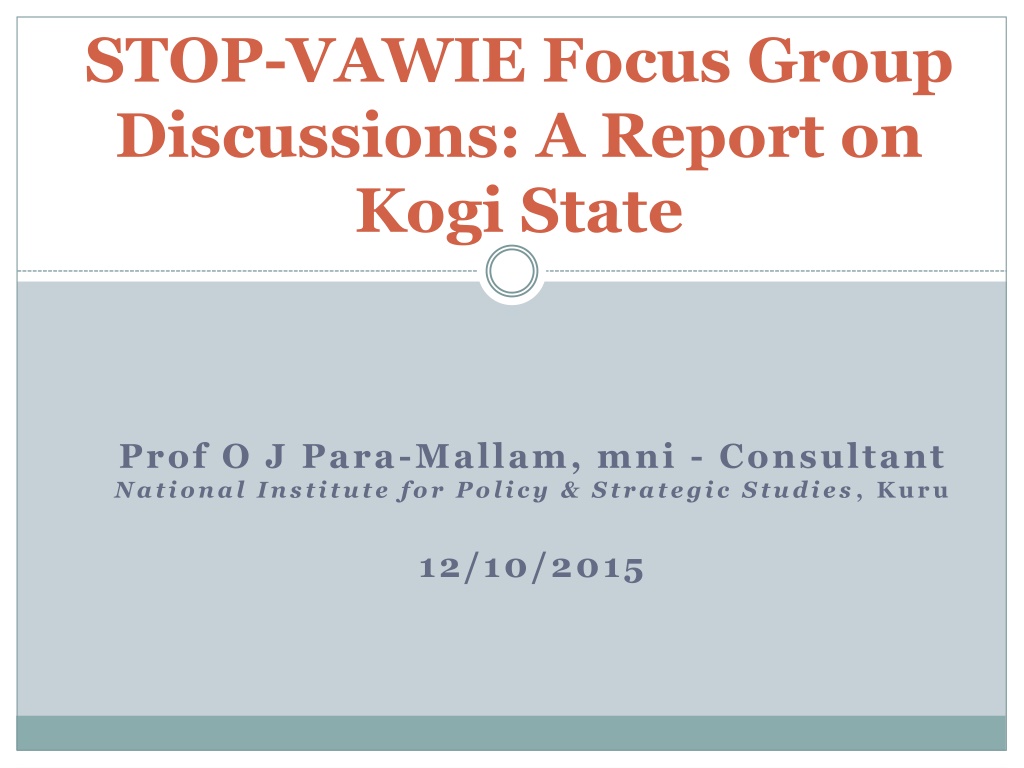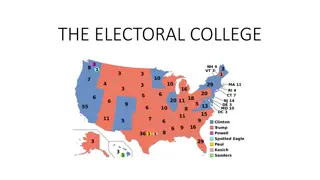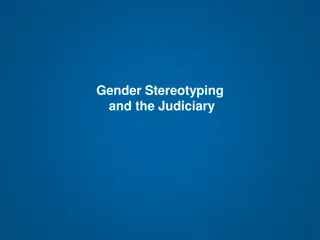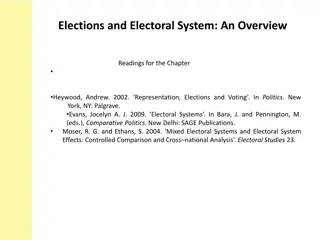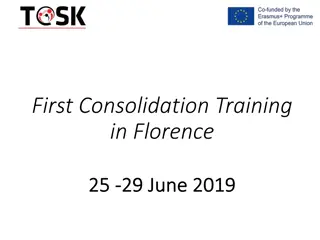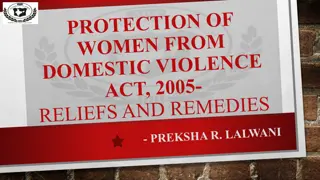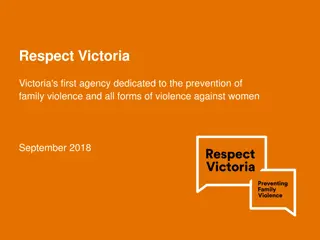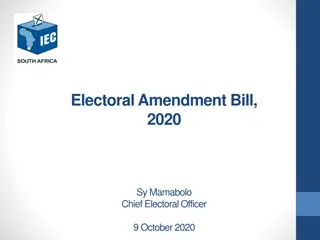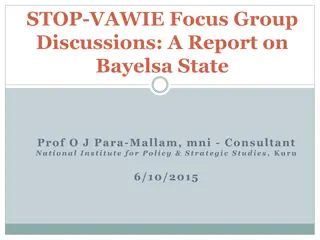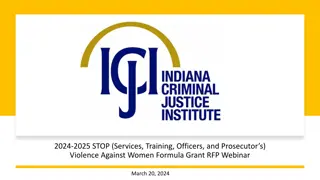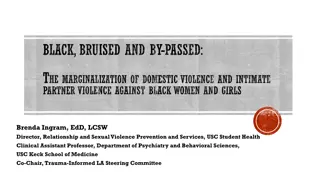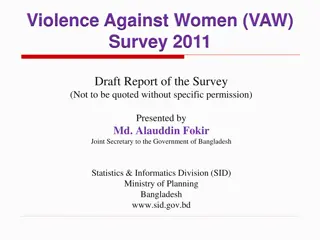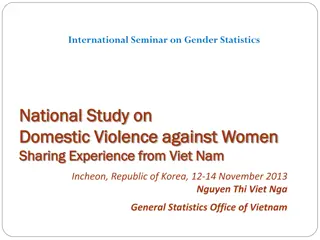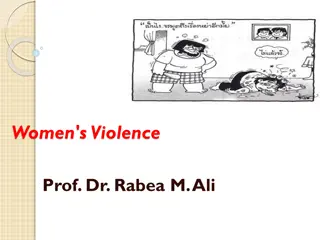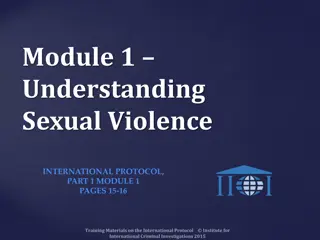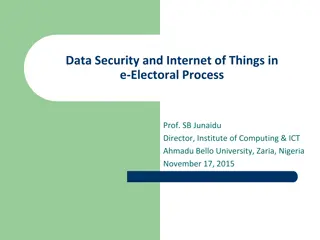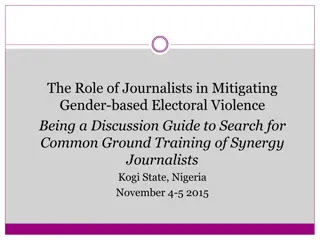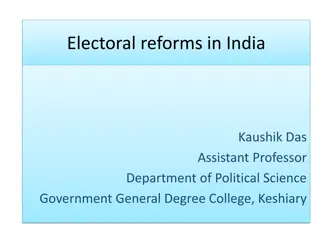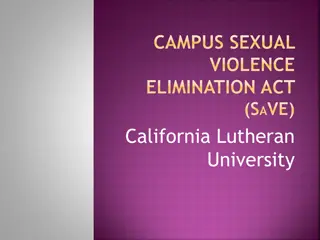Understanding Electoral Violence Against Women in Kogi State
This report presents findings from focus group discussions on violence against women in elections in Kogi State, Nigeria. The study aims to uncover the various forms of electoral violence experienced by female candidates and voters, identify perpetrators, examine the impact on women's political participation, evaluate institutional redress mechanisms, and explore potential solutions. Methodology involved participatory FGD sessions with 16 women, revealing widespread violence and challenges faced in the electoral process.
Download Presentation

Please find below an Image/Link to download the presentation.
The content on the website is provided AS IS for your information and personal use only. It may not be sold, licensed, or shared on other websites without obtaining consent from the author. Download presentation by click this link. If you encounter any issues during the download, it is possible that the publisher has removed the file from their server.
E N D
Presentation Transcript
STOP-VAWIE Focus Group Discussions: A Report on Kogi State Prof O J Para-Mallam, mni - Consultant National Institute for Policy & Strategic Studies , Kuru 12/10/2015
AIM of the STUDY TO FOSTER AN UNDERSTANDING OF THE CONTEXTUAL DYNAMICS AGAINST WOMEN IN ASSIST POLICY MAKERS, ACTORS AND CIVIL SOCIETY ACTIVISTS TO DESIGN WELL-TARGETED SOLUTIONS OF VIOLENCE ELECTIONS AND POLITICAL
Specific Objectives Discover what specific forms and levels of violence female aspirants/ candidates, party activists, supporters and voters encountered 1. Investigate the identity of the perpetrators of the various forms of electoral violence 2. Investigate the immediate and remote causes of electoral violence against women 3.
Specific Objectives Understand the potential or actual impact of VAWIE on women s ability to participate in the electoral process as well as on the democratic quality of the election 4. Assess the nature and effectiveness of state or non-state institutional mechanisms in providing redress for female victims of electoral violence 5. Gain an understanding of women s perspectives on possible solutions to electoral violence 6.
METHODOLOGY Technique: The FGD technique, being a participatory method Sample: Two FGDs were held with eight (8) participants each a total of 16 women consisting of voters, aspirants/candidates and election officials A brief PowerPoint presentation: To standardized definition of VAWIE Modality: Two (2) two-hour FGD sessions were held one in the morning and another in the afternoon
Data Presentation: Discussion (1) Because what these male candidates will do, they will go and borrow money, they will even go and sell their land to give the delegates. And delegates, they go for highest bidder. So at the end of the day, you will see yourself going nowhere. That was what happened. So even in appointing offices, then we had only one woman in the Kogi State House of Assembly. But today, no woman. So we re going from frying pan to fire . (FGD participant, 12/10/2015) Nature and Extent of Violence All types of violence are present and widespre ad.
Data Presentation: Discussion (2) They use security agents. Local security agents they call them vigilantes. They use them to intimidate politicians. Most of them they came out and have already taken sides before they became a member. So when they become members, they (politicians) use their position as vigilante group members to set trap for aspirants. (FGD participant, 12/10/2015) Perpetrators Men Male- dominated political machinery Society Women
Data Presentation: Discussion (3) Poor participation of women in election processes stems from the strong ideology of gender bias as embedded in tradition. Causes of VAWIE Tradition is the root cause of all other forms of VAWIE Lack of access to critical resources such as education and leadership. The over-riding political culture of money politics and godfatherism
Data Presentation: Discussion (4) Leaders being selected instead of elected causing lack of accountability to the electorate. For instance, the market women leader claimed that, the local government chairpersons, they were all planted by the government of the day. They don t have anything to give or say. Impacts of VAWIE On women On quality of democracy The one (violence) that comes from inside too (from women), let s talk about it. When women are jealous of each other and are the ones perpetrating violence against themselves. Because we are more in number, without money we can get somebody into position. (FGD participant, 10/10/2015) Poor quality of work, which leads to underdevelopment and anarchy.
Data Presentation: Discussion (5) Mechanisms to curb VAWIE State Non-state The one (violence) that comes from inside too (from women), let s talk about it. When women are jealous of each other and are the ones perpetrating violence against themselves. Because we are more in number, without money we can get somebody into position. (FGD participant, 10/10/2015) State: zero to low awareness Non-State: FIDA can help pursue (cases of electoral violation) (FGD participant, 12/10/2015)
Data Presentation: Discussion (6) Solutions to VAWIE Short to Medium-term Women should be in support of one another. Voter education will go a long way in creating the right civic awareness in the citizenry especially the women. There should be collective gender solidarity. Long-term Break the culture of tradition-induced gender inequality. Strengthen security agencies to effectively handle VAWIE cases. Formulation of anti-VAWIE policies backed by strong political will.
SUMMARY OF KEY FINDINGS The women in Kogi State experience different types of election violence which can be identified as physical, sexual, psychological, socio-economic and harmful traditional practices. Men are found to be at the leading edge of perpetrating VAWIE alongside the different societal structures at their beck and call which include security personnel, husbands and the youth. Poor participation of women in election processes stems from the strong ideology of gender bias as heavily embedded in tradition.
SUMMARY OF KEY FINDINGS (Contd.) Women withdraw from full participation in election processes due to VAWIE. This results in zero representation of women at all levels of decision making. This gender discrimination has led to lopsided development and poor leadership. Awareness of existence of institutional mechanisms to curb VAWIE is at a low ebb among women in Kogi State and those who do know about them confirmed that they were not functional in the State. Women in Kogi anticipate positive shift through short and long-term solutions to VAWIE.
